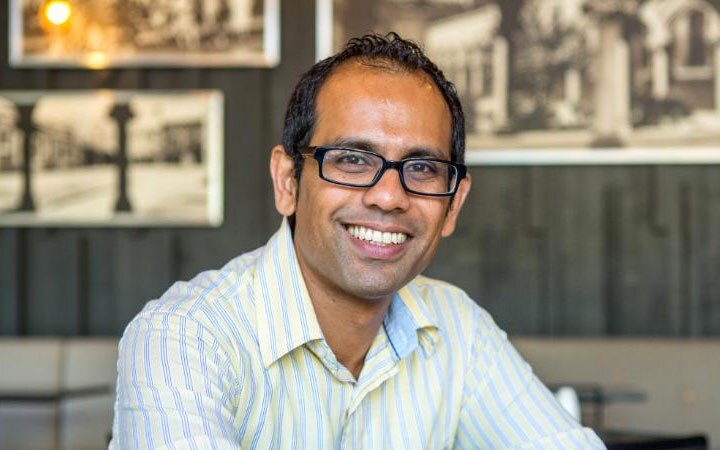Indian-origin professor studies well-being of Airbnb hosts in Canterbury

Recent research undertaken by University of Canterbury Business School professors Girish Prayag and Lucie Ozanne examines the well-being of Airbnb hosts and the factors that contribute to hosts having conflicts with guests.
Prof Prayag is a 6th generation Mauritian Indian who grew up on the idyllic island of Mauritius, listening to Bollywood songs and watching Hindi movies. He also studied Hindi at School and is fluent in English, French and Creole (the native language of the island).

Prof Prayag completed his undergraduate and post-graduate studies in South Africa and moved to New Zealand after winning a doctoral scholarship to study in New Zealand at the University of Waikato. After completing his doctoral studies, he worked in France for 3.5 years.
Professor Prayag returned to NZ in 2012 and has been with the University of Canterbury for nine years, starting as a lecturer and rising to a full professor in 2019.
Having done his doctoral training in tourism marketing, Professor Prayag has extensively explored and researched tourism and marketing.
Professor Prayag told Indian Weekender, “I am particularly interested in tourist behaviour within and outside of New Zealand. Since the Canterbury earthquakes I am also interested in the resilience of tourism and other types of businesses and how these businesses become more sustainable. The COVID-19 pandemic has allowed me to explore further how these businesses build their resilience and the factors that have allowed them to get through the pandemic.”
Since Professor Prayag is based in Canterbury, one of the most popular tourist destinations globally, he has the perfect backdrop to do in-depth research on tourism marketing-related subjects. Some of his projects prior to COVID-19 included the analysis of the sustainable practices that international tourists to the Canterbury region engage in. The Tourism Industry NZ Trust(TINZT) funded the project.
He also completed a project in collaboration with ChristchurchNZ, examining the impacts of Airbnb on the accommodation sector in the Canterbury region. When the COVID-19 pandemic hit the world, bringing travel to a standstill and causing huge revenue loss to the tourism sector, Professor Prayag launched several projects examining how tourism businesses are navigating the pandemic and the phenomenon of panic buying in NZ.
His latest study, along with Lucie Ozanne, published recently in the journal Frontiers in Psychology, examines Airbnb hosts’ well-being and the factors contributing to hosts' conflicts with guests.
In recent years, the use of Airbnb to find accommodation has exploded globally, but despite its growing popularity, there are some troubling issues with Airbnb hosting. Professor Prayag and Professor Ozanne focussed on the well-being of the hosts and related concerns. Airbnb accommodation listings in the region have increased from 0.7 percent in 2016 to 21.6 percent in 2018.
They conducted interviews with 22 Airbnb hosts operating in the Canterbury region and found that the hosting experience can both enhance and reduce their well-being.
Study revealed that the hosting experience can affect stress and anxiety levels, reduce enjoyment and self-efficacy, thus affecting well-being. Airbnb guests often do not show proper care and respect to property often breaking and sometimes stealing things. Even if they are covered by insurance, hosts still feel that this kind of behaviour by the guests can have unintended negative consequences on their lives.
Some participants spoke about the lack of boundaries between hosts and guests in shared Airbnb accommodation, where hosts can specify what acceptable or unacceptable behaviour is but guests ignore these and do what they want. At other times, hosts do not clearly specify the boundaries and guests get confused about what is acceptable or not.
“The negative side arises when they haven’t set clear boundaries between private areas and those that are for the guests to enjoy,” says Professor Prayag. “If the guests treat the property as just another hotel room, that can create conflict and tension, and in shared spaces the boundaries issue is probably bigger.”
Professor Prayag says the other downside is when guests provide feedback the hosts are not expecting. “They might have said one thing in person, but their comments online are very different.”
He says it’s important that peer-to-peer accommodation providers such as Airbnb train hosts to boost their managerial skills and ensure they have realistic expectations around what’s involved.
“It’s important that hosts know how much they can set and enforce their own house rules and that guests understand those rules as well.”
Professor Ozanne says Airbnb hosts also reported positive effects from the role, including financial, social and emotional benefits.

“In some cases, the additional income allows them to plan for their retirement. There are also social benefits, such as meeting new people and interacting with people from other cultures and feeling good about providing authentic experiences to their guests.”
Professor Prayag says because the data was collected before the COVI-19 pandemic, there’s a need for further research to see what its impact has been on host well-being.





